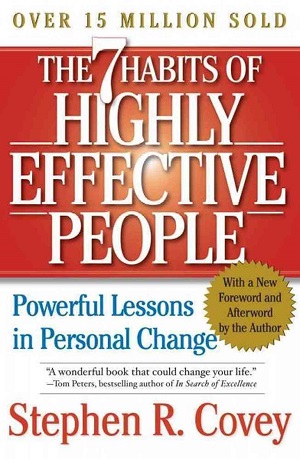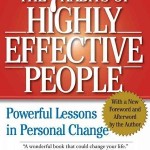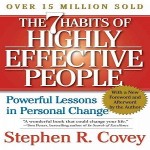 Whether the reason for landing on this article is that you heard of this Steve Covey’s famous book called 7 Habits of Highly Effective People or you saw a share on one of the social media sites, you’re at the right place.
Whether the reason for landing on this article is that you heard of this Steve Covey’s famous book called 7 Habits of Highly Effective People or you saw a share on one of the social media sites, you’re at the right place.
I read this book years ago and I must say it was the best start to my personal development path and needless to say I highly recommend it. Just looked at my bookshelf and can’t see it – must have lent it to someone recently.
Before going into the actual 7 habits, the author Steve Covey goes into few important concepts.
Character Ethic (good)
There are basic principles of effective living and people can only experience true success and enduring happines as they learn and integrate these principles into their basic character.
Personality Ethic (not so good)
It is manipulative, deceptive, encouraging people to use techniques to get other people to like them. Personality ethic is illusory and deceptive and trying to get high quality results with its techniques and quick fixes – not effective at all.
Paradigm
The book talks a lot about paradigm shifts and I remember having to look it up in the dictionary to find the true meaning of it; paradigm meaning: model, theory, perception, assumption, the way we see world.
Conditioning affects our perceptions/paradigms (old/young lady drawing example in the book worth checking out). We see the world not as it is but as ‘we are’ through our paradigms. Different people can have different views and still both be correct. The more aware we are of our basic paradigms the more we can examine/test them against reality, listen to others and be open to their perceptions getting a larger picture and far more objective view.
Paradigm shifts move us from one way of seeing the world to another. They influence our relationship with others. Not all are good. If we want to make relatively minor changes in our lives we can appropriately focus our attitudes and behaviours, but to make significant quantum change we need to work on our basic paradigms from which our attitudes and behaviours flow.
Paradigms are powerful because they create the lens though which we see the world. The power of paradigm shift is the essential power of quantum change whether that shift is instantaneous or a slow and deliberate process.
Importance of Principles
Character ethic is based on the fundamental idea that there are Principles that govern human effectiveness, natural laws in the human dimension that are just as real and unchanging as gravity and physical dimension. Principles are deep fundamental truths that have universal application to individuals, marriages, families, private and public organisations. Principles are guidelines for human conduct that are proven to have enduring permanent value,
they’re fundamental.
The more closely our paradigms are aligned with these principles or natural law, the more accurate the functional they will be.
The new level of thinking is needed. Principle-centred, character based, inside out approach (start first with self) to personal and interpersonal effectiveness. Generate positive energy, sidestep negative energy, be more understanding/empathic to your kids, more responsible,
helpful, contributing, trustworthy employee.
Steve divides these habits into 2 categories being Personal and Public victory habits.
Personal victory habits pertain to something you must conquer in your own backyard, on a personal level to have any chance of moving onto Public Victory habits which will help you influence, help and work with others.
Personal Victory Habits
1. Be Proactive
As human beings we are responsible for our own lives. Our behaviour is a function of our decisions not our conditions.
Where we focus our time/energy
Circle of Influence: proactive people focus their effort, things that you CAN do something about. Circle of Concern: Past mistakes are part of Circle of Concern. We can recall them, we can’t undo them, we can’t control consequences that came as a result. Proactive approach to a mistake is to acknowledge it instantly, correct and learn from it, turn failure into a success.
2. Begin with the end in mind (leadership)
Means to start with a clear understanding of your destination, to know where you’re going so that you better understand where you are now and so the steps you take are always in the right direction. We may be very busy, we may be very efficient, but we will also be truly effective only when we begin with the end in mind.
3. Put first things first (effective management)
Independent will is required, the power to do something when you don’t want to do it, to be a function of your values/principles rather then the function of the impulse or desire of any given moment. Focus on important but not urgent things such as prevention, personal development activities, relationship building, recognising new opportunities, planning, recreation, writing personal mission statement, long range planning.
Public Victory Goals
Self-mastery and self-discipline are the foundation of good relationship with others.
4. Think Win/Win
Agree a philosophy where agreements / solutions are mutually beneficial and satisfying so all parties remain committed to the action plan. Based on paradigm that there is plenty for everyone – mentality of abundance. Either Win/win or ‘no deal’ outcomes are better than having a result where one party is at a great disadvantage.
5. Seek first to understand and then to be understood
Listen with intent to understand. Don’t rush in to fix things with quick advice. Empathic Listening: don’t listen with intent to reply and don’t auto-biographise. Diagnose before you prescribe. ‘Sell’ a solution and not just product.
Listen 3 times more than you talk.
6. Synergize
The whole is greater then the sum of its parts. Trust + cooperation + bonding + teamwork. Valuing the differences is the essence of synergy: mental, emotional, psychological. Value your differences as they add to your knowledge and understanding of reality.
7. Sharpen the saw
Balanced self renewal, personal production capability. Greatest asset is you, don’t kill the goose that lays golden eggs.
There are 4 areas of Renewing
– Physical (Exercise, nutrition, stress management),
– Spiritual (Commitment, study, meditation),
– Mental (reading, visualising, planning, writing)
– Social/Emotional (service, empathy, synergy, intrinsic security)
Example of a daily renewing habit: a minimum of one hour a day in renewal of the physical, spiritual and mental dimensions is the key to the development of the seven habits and it is within your Circle of Influence.




Hi Dario, I read this book a few years ago also. A great summary you have made here about the main points!
This is the type of book that should be reread on a regular basis.
John, I had this summary with me since I read it and decided to share. These principals truly are timeless! I’m glad you enjoyed it 🙂
Wow you condensed the whole book in a few paragraphs. Excellent job! This book is like your guideline for a happier healthier way of life. It’s meant to be read and reread as many times as it will help you to consistently make the right choices in your life.
Your summary is very helpful, thank you!
If you want, summarise other personal development books as well, apparently you are good at it!
Have you ever thought about including a little bit more than just your
articles? I mean, what you say is fundamental and everything.
But imagine if you added some great images or video clips
to give your posts more, “pop”! Your content is excellent but with pics and clips, this blog could definitely be one of the very best in its field.
Amazing blog!
Wow! Thank you! I constantly wanted to write on my site something like that.
Can I include a portion of your post to my blog?